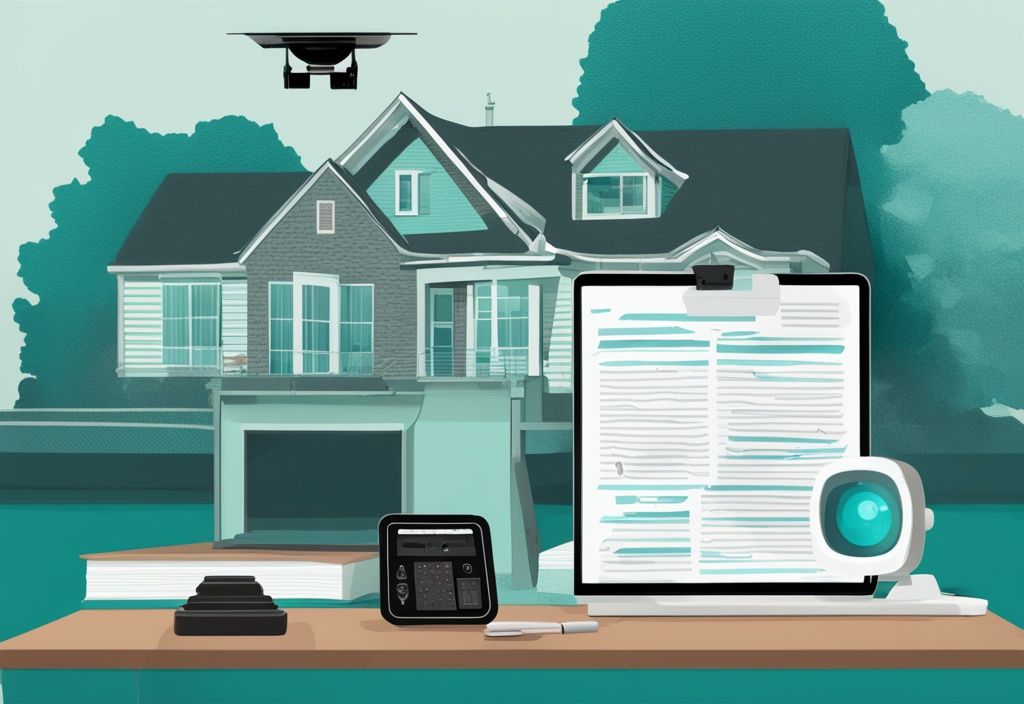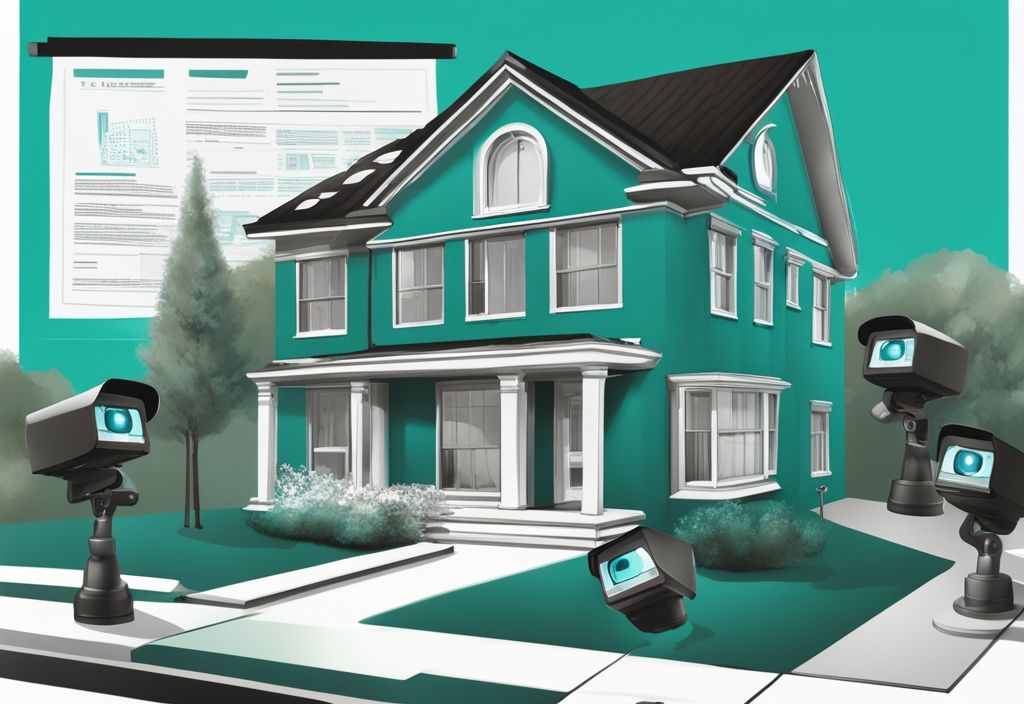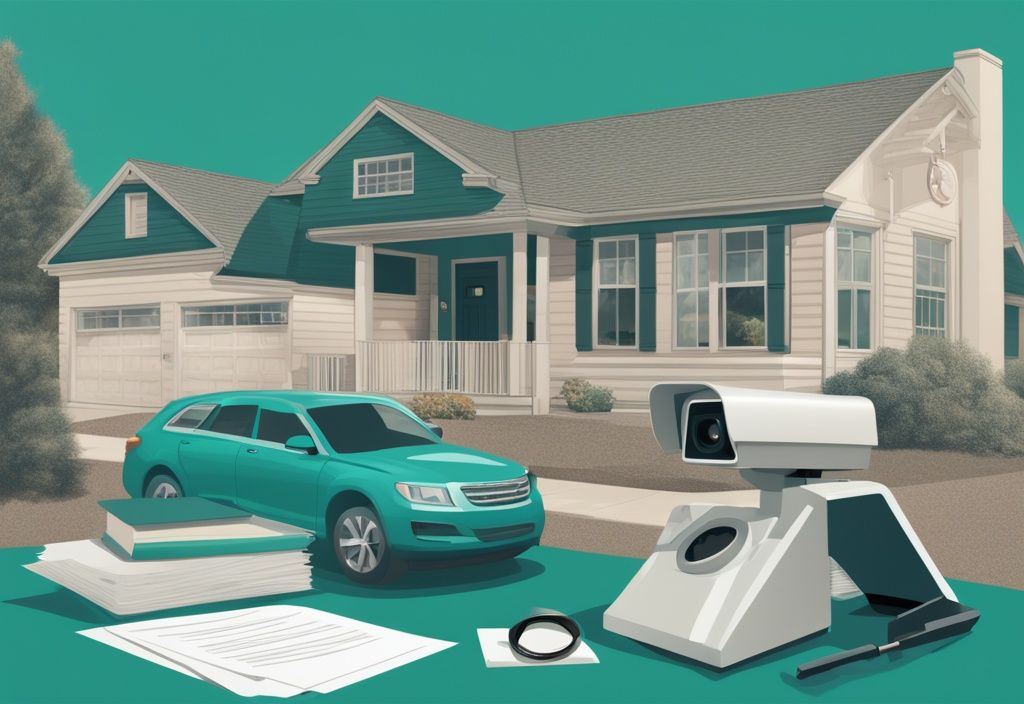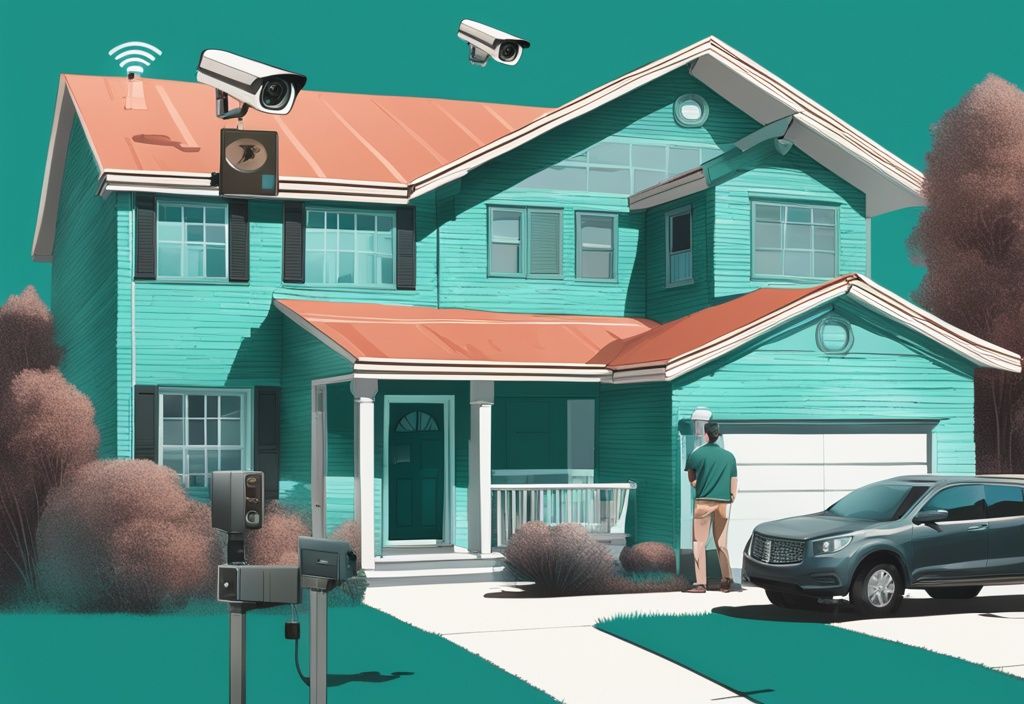Guide: Laws on Outdoor Surveillance Cameras for Home
Ever wondered if your outdoor surveillance cameras could land you in hot water? As a seasoned home security expert, I’m here to guide you through the legal maze. Federal, state, and local laws dictate the do’s and don’ts of using these security devices. One wrong move could lead to legal headaches and hefty fines.
In this comprehensive guide, we’ll dive into the nitty-gritty of laws on outdoor surveillance cameras for home. You’ll learn about video and audio recording regulations, privacy concerns, and the benefits of having a watchful eye on your property.
Why did you click on this article? I bet it’s because you want to protect your home while staying on the right side of the law. So, let’s get started. Stay informed, stay compliant, and let’s safeguard your home together.
Understanding Federal Laws on Outdoor Surveillance Cameras
Video Recording Regulations
Federal law generally permits video recording in both public spaces and on private property, making it a common practice for homeowners looking to enhance security. However, this allowance comes with crucial caveats. Recording should not extend to areas where individuals have a reasonable expectation of privacy, such as bathrooms and bedrooms. This respect for privacy is essential to avoid legal complications. Additionally, the Fourth Amendment of the U.S. Constitution, which guards against unreasonable searches and seizures, can play a significant role in determining the legality of certain surveillance practices. This amendment ensures that surveillance does not infringe on personal privacy rights without due cause.
Audio Recording Regulations
The regulations surrounding audio recording are more stringent compared to video recording. Federal law, influenced by the Electronic Communications Privacy Act (ECPA), generally allows audio recording under specific conditions. One-party consent laws, which are prevalent in many states, permit audio recording as long as at least one participant in the conversation is aware and consents to the recording. However, several states have stricter all-party consent laws, requiring the consent of every individual involved in the conversation. The ECPA further complicates matters by prohibiting the unauthorized interception of wire, oral, or electronic communications, making it critical for homeowners to understand their state’s specific consent laws to avoid legal repercussions.
Key Federal Acts You Should Know
Electronic Communications Privacy Act (ECPA)
The Electronic Communications Privacy Act (ECPA) is a pivotal federal statute that impacts the legality of audio recording in surveillance practices. This act explicitly prohibits the unauthorized interception of wire, oral, or electronic communications. For homeowners, this means that any audio captured by surveillance cameras must comply with consent laws to avoid violating the ECPA. Understanding the nuances of this act is essential for legally implementing audio surveillance on private property.
Video Voyeurism Prevention Act (VPPA)
The Video Voyeurism Prevention Act (VPPA) is another critical federal law that governs the use of surveillance cameras. This act specifically prohibits the capture of images of private areas without consent. It applies to situations where individuals have a reasonable expectation of privacy, such as in bathrooms, bedrooms, or other private spaces. For homeowners, this means that surveillance cameras should be strategically placed to avoid capturing images in these sensitive areas, ensuring compliance with the VPPA and respecting the privacy rights of individuals.
State-Specific Laws on Outdoor Surveillance Cameras
In the realm of laws on outdoor surveillance cameras for home, understanding state-specific regulations is crucial. Each state has its own approach to balancing privacy and security, and knowing these laws can help you stay compliant while keeping your home safe.
States with Strict Audio Recording Laws
When it comes to audio recording, some states have particularly stringent regulations. States like California, Delaware, Florida, Illinois, Maryland, Pennsylvania, and Massachusetts require all-party consent for audio recordings. This means everyone involved in a conversation must agree to the recording. These laws are designed to respect privacy rights and prevent unauthorized audio surveillance.
States with Specific Camera Placement Laws
Different states have unique legal requirements for the placement of outdoor surveillance cameras to ensure privacy and transparency:
- Georgia: Cameras must be placed in plain sight to avoid covert surveillance.
- Florida, Alabama, Minnesota: Hidden cameras are permitted in non-private settings, allowing flexible surveillance options outside private areas.
- Tennessee, Michigan, Utah: Consent is required for hidden cameras in private places, ensuring privacy is not infringed upon.
- Hawaii: Any form of surveillance requires consent, emphasizing transparency.
- New Hampshire, Maine, Kansas, South Dakota, Delaware: Consent is required for hidden cameras based on the reasonable expectation of privacy, protecting areas where privacy is typically expected.
- California: Recording of confidential communications is prohibited, safeguarding private conversations.
- Arkansas: Consent is required for surveillance in private spaces, maintaining privacy in sensitive areas.
- New York: Video surveillance on private premises is allowed, but audio recording requires consent, balancing security needs with privacy rights.
- Washington: Video recording of private property perimeters is permitted, but all-party consent is required for audio recordings.
- Texas: Video monitoring on private property is allowed, but notification signage is required for audio recording, ensuring individuals are aware of the surveillance.

These state-specific laws on outdoor surveillance cameras for home highlight the importance of understanding and complying with local regulations. Each state’s approach to surveillance is designed to protect privacy while allowing for effective security measures.
Privacy Considerations for Home Surveillance
When setting up outdoor surveillance cameras for home use, it’s essential to balance security needs with privacy concerns. This section covers key aspects to ensure your surveillance system is both effective and respectful of privacy laws.
Areas with Reasonable Expectation of Privacy
When installing outdoor surveillance cameras, it’s crucial to respect areas where individuals have a reasonable expectation of privacy. Think about it—would you want a camera in your bathroom or bedroom? These areas, including bathrooms, bedrooms, and other private spaces, are off-limits. Placing cameras in such sensitive spots can lead to legal trouble and erode trust. For more information on securing your network, check out our article on the differences between WPA2 vs. WPA3. Always prioritize privacy by avoiding these areas to comply with privacy laws and maintain the trust of those in your household or property.
Best Practices for Camera Placement
Adhering to best practices for camera placement is essential to balance security needs with privacy considerations. First and foremost, ensure that cameras are installed in plain sight. Concealed cameras can lead to legal issues and mistrust. Position the cameras to focus on your property or public areas, avoiding any direct line of sight into neighbors’ windows. This approach not only respects your neighbors’ privacy but also helps in avoiding potential legal disputes. Strategic placement is key—ensure your cameras cover critical areas such as entry points and driveways without infringing on others’ privacy.
Transparency and Notification
Signage Requirements
Transparency is a cornerstone of ethically deploying surveillance cameras. Most jurisdictions mandate informing residents and visitors about the presence of surveillance cameras through clear and visible signage. This signage should explicitly state that surveillance is taking place. In cases where audio recording is involved, the signage may need to include this information as well. Proper signage not only helps in complying with laws on outdoor surveillance cameras for home but also fosters a sense of openness and trust.

How to Inform Residents and Visitors
Keeping residents and visitors informed about the surveillance system is not just a legal requirement but also a best practice for maintaining trust and transparency. Clearly communicate the presence of surveillance cameras and provide details about their purpose, how the footage will be used, and who will have access to it. This can be done through written notices, emails, or meetings. Additionally, if there are significant changes to the surveillance system, such as adding new cameras or changing their locations, promptly inform all affected parties. For more information on camera specifications, you might want to understand the differences between IP66 vs IP67. This approach ensures that everyone is aware and consents to the surveillance measures in place.
Local Ordinances and Registration Requirements
Understanding the laws on outdoor surveillance cameras for home is crucial for maintaining both security and legal compliance. This section delves into the specifics of local ordinances and registration requirements that you need to be aware of.
Municipal Registration Requirements
Local or municipal governments often have specific registration requirements for security cameras and alarm systems. For instance, Suffolk County in Long Island mandates the registration of systems linked to local police alarms. This registration ensures that authorities can respond promptly and appropriately to any incidents captured by the surveillance system.
It’s crucial to check your local ordinances to understand any specific registration requirements that may apply to your area. Failing to comply with these regulations can result in fines or other legal consequences. Think of it like forgetting to renew your car registration—it’s a small step that can save you a lot of trouble down the road.
Examples of Local Ordinances
Local ordinances can vary significantly from one municipality to another, often addressing specific aspects of camera placement, required signage, and data retention policies. For example, some municipalities may require that surveillance cameras be placed in visible locations to deter criminal activity. Others might have strict regulations about the retention and storage of recorded footage.
Ensuring compliance with these local laws is essential for the legal and effective use of outdoor surveillance cameras for home security. Always verify the specific laws in your area to avoid any legal issues and to fully understand the requirements and limitations imposed by your local government. It’s like knowing the rules of the road before you drive—essential for a smooth journey.
Benefits of Outdoor Surveillance Cameras
Proactive Security
Outdoor surveillance cameras are like having a vigilant neighbor watching over your home. They play a crucial role in deterring potential offenders and enhancing the security of residential properties. The presence of visible cameras can discourage criminal activities such as theft, vandalism, and trespassing. Think of them as your first line of defense. For added security, consider using an RFID Gate Opener Sticker, which provides an additional layer of protection. By capturing footage in real-time, homeowners can monitor suspicious activities and respond promptly, either by contacting law enforcement or taking preventive measures. Additionally, recorded video can be analyzed to identify patterns and potential security vulnerabilities, allowing for improved security strategies. The use of outdoor surveillance cameras for home security is generally considered reasonable and legal, provided that the placement and usage comply with relevant laws and regulations.
Operational Efficiency
Outdoor surveillance cameras contribute significantly to the operational efficiency of home management. Imagine being able to keep an eye on your property conditions, such as the status of outdoor structures, landscaping, and other maintenance needs, without leaving your couch. By identifying issues early, homeowners can address them promptly, preventing costly repairs and ensuring the property remains in good condition. Surveillance cameras equipped with high-resolution imaging, motion detection, night vision, and remote viewing capabilities offer enhanced monitoring. These features allow homeowners to track foot traffic patterns, ensuring the safety of residents and visitors while optimizing the use of outdoor spaces.

Liability Protection
The use of outdoor surveillance cameras for home protection extends beyond security to offer substantial liability protection. Video footage from these cameras can serve as critical evidence in the event of accidents, disputes, or legal claims. For instance, if an incident occurs on the property, the recorded footage can help determine the facts and provide indisputable evidence. This can be particularly useful in resolving conflicts with neighbors, contractors, or service providers. Adhering to laws on outdoor surveillance cameras for home is essential, but the benefits of proactive security, operational efficiency, and liability protection make these systems a valuable investment for homeowners.
FAQ
Are outdoor surveillance cameras legal on private property?
– Yes, outdoor surveillance cameras are generally legal to install on your own property. Just make sure you’re following federal, state, and local laws regarding placement and usage. Understanding specific regulations helps you avoid legal complications.
Do I need consent to record audio with my surveillance cameras?
– Consent requirements vary by state; some states require all-party consent for audio recording. The Electronic Communications Privacy Act (ECPA) impacts audio surveillance by prohibiting unauthorized interception of communications. It’s essential to check your state-specific laws to stay compliant.
Can I point my outdoor camera at my neighbor’s property?
– Outdoor cameras should not be pointed directly into neighbors’ windows to avoid privacy violations. Ensure your cameras are focused on your property or public areas. This respects your neighbors’ privacy and keeps you within legal guidelines.
What are the federal laws governing outdoor surveillance cameras?
– Federal laws like the Electronic Communications Privacy Act (ECPA) and the Video Voyeurism Prevention Act (VPPA) may apply. The Fourth Amendment of the U.S. Constitution is also relevant as it protects against unreasonable searches and seizures, impacting your surveillance practices.
Do I need to inform visitors about my surveillance cameras?
– Yes, transparency is crucial. Most jurisdictions require you to inform residents and visitors about surveillance through clear signage. The Federal Trade Commission (FTC) emphasizes transparency and encourages homeowners to inform visitors about surveillance cameras. This promotes trust and legal compliance.
Conclusion
Understanding and complying with federal, state, and local laws on outdoor surveillance cameras for home is essential for ensuring that your security measures are both effective and legal. Federal laws like the Electronic Communications Privacy Act (ECPA) and the Video Voyeurism Prevention Act (VPPA) set the groundwork, but state-specific regulations can vary significantly, particularly concerning audio recording and camera placement. Compliance with these laws helps protect privacy rights and avoid legal repercussions.
Proper placement of surveillance cameras is crucial. Cameras should be installed in visible locations and focused on your property or public areas to respect neighbors’ privacy. Avoid positioning cameras in areas with a high expectation of privacy, such as bathrooms or bedrooms. Strategic placement not only helps in adhering to legal standards but also maximizes the effectiveness of your surveillance system by ensuring comprehensive coverage of the intended area.
Transparency is another vital aspect of using outdoor surveillance cameras. Informing residents and visitors about the presence of surveillance cameras through clear signage is often legally required and fosters trust. Signage should clearly indicate the presence of cameras and, where applicable, mention audio recording. Transparent communication about the purpose of surveillance, how the footage will be used, and who will have access to it is essential for maintaining good relationships with neighbors and complying with legal requirements.
Lastly, always verify specific regulations in your local area. Municipalities may have unique ordinances regarding camera registration, placement, and data retention. Checking local laws ensures full compliance and helps you avoid any legal issues. By following these guidelines, you can effectively utilize outdoor surveillance cameras while respecting privacy rights and adhering to the laws on outdoor surveillance cameras for home.
I’m James Albright, a home security expert with over 15 years of experience, and I’m passionate about helping families protect what matters most. After serving as a police officer, I transitioned to security consulting to share my hands-on knowledge and practical tips. My mission is to make home security simple and reliable by offering clear, no-nonsense advice and easy-to-follow guides. When I’m not reviewing the latest security tech or writing, I’m out in the community leading neighborhood watch programs and, most importantly, keeping my own family safe.





Post Comment